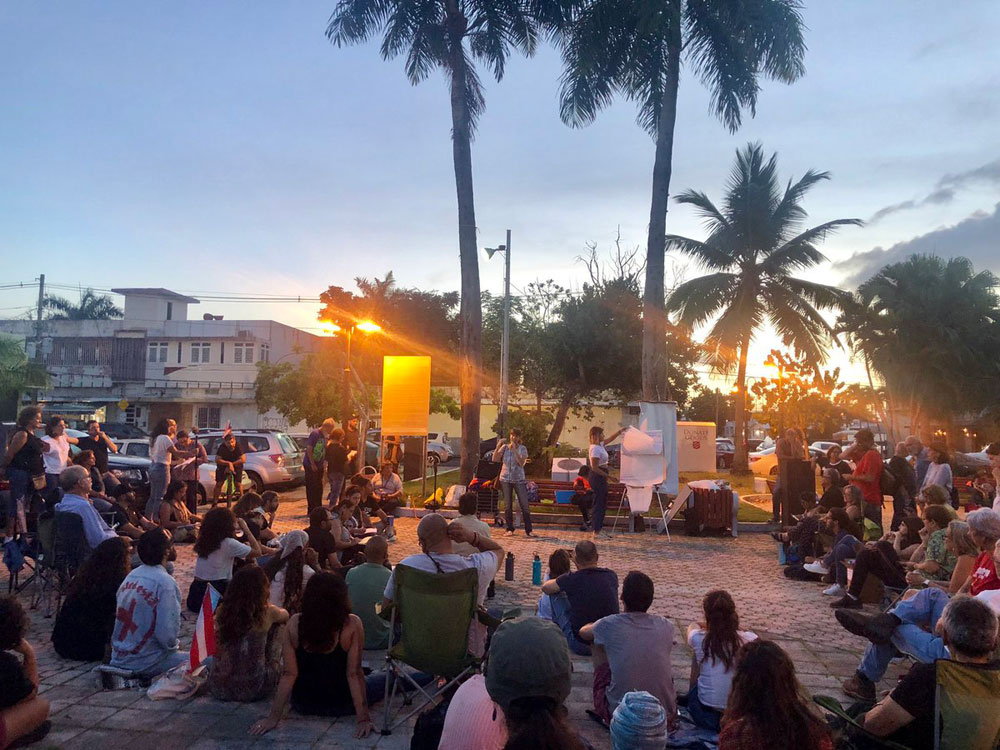
August 20, 2019; NACLA
After successfully bringing down the governor of Puerto Rico, who stepped down in August, the people of Puerto Rico have turned to holding public assemblies to reflect on how to move into addressing critical issues and building a popular democracy. These are radical goals, especially for a people that have long lived under colonization.
The first of the “people’s democratic assemblies” called by civil society groups across the island was held in Ponce, on the southern coast, Puerto Rico’s second-largest city. Assemblies have also been held in Mayaguez, Lares, Utuado, Caguas, Gurabo, San Juan, and Carolina. The social media hashtag #asambleadepueblo, like #RickyRenuncia before it, helps spread the word and ignite action.
The movement that brought down Rosselló gave Puerto Ricans an experience of popular power. Now they are asking, “How far can this newly acquired power be taken?”
Professors Jacqueline Villarrubia-Mendoza and Roberto Vélez-Vélez, writing for the North American Congress on Latin America, describe the assemblies this way:
These newly emerging spaces have taken different shapes, but all through an organic process where the focus is the collective. Some have opted for assemblies where people are divided into small groups—no more than 10-15 people—where everyone reflects on the questions posited by conveners, later to be shared in a plenary-style format. This particular assembly format…has been organized around questions that address what is happening in Puerto Rico, what is to be done about the different issues, and how to collectively organize….The goal of this assembly format is to allow everyone an opportunity to voice their grievances and ideas—especially those who might be new to political activism.
Sign up for our free newsletters
Subscribe to NPQ's newsletters to have our top stories delivered directly to your inbox.
By signing up, you agree to our privacy policy and terms of use, and to receive messages from NPQ and our partners.
Other assemblies…have opted for an open-meeting format where those interested in participating have anywhere between two to five minutes—depending on how many people are in attendance—to reflect on the current situation or to share their concerns and proposed solutions. In these, coordinators request that people sign up for a turn to speak, a sort of record-keeping to avoid that any one person dominate the discussion, while also holding everyone to preset time limits. Regardless of the model used, the assemblies share common principles of inclusivity, horizontality, and openness. (Italics mine.)
They note that even though the assemblies have just begun, they are already noticing shared issues that focus around socioeconomic and political concerns. This is to be expected in a nation that is bearing the weight of US-led austerity measures. On the socioeconomic front, the people want to address the recent labor reform (which limits the rights for the next generation of workers and threatens the pensions of the outgoing generation), the decline of the educational system (including large-scale closing of schools), the privatization of essential services (such as healthcare and utilities), and access to safe and affordable housing (many homes were destroyed by Hurricane Maria and need to be replaced with homes for our climate times).
Political concerns include the legality of the massive national debt (which the people are asking for an audit of, given the recent revelations of long-assumed corruption), alternatives to traditional parties (as both are monopolized by the elite), and the resolution of the island’s colonial status (“a system that has been designed to dominate,” and which many believe is at the core of many of the problems).
As a next step, assemblies are moving towards creating working groups tasked with designing and implementing action plans, and workshops to educate people on participatory democracy.
Villarrubia-Mendoza and Vélez-Vélez describe the assemblies as part of a political awakening. They note that they suggest a process of appropriating democracy. This, in turn, is part of a larger global trend of a growing civil society. A recent report on civil society finds that “while many governments are cracking down on civil society…Viewed at a global level, civil society is flourishing.” Puerto Rico is a perfect testament to that.—Cyndi Suarez










